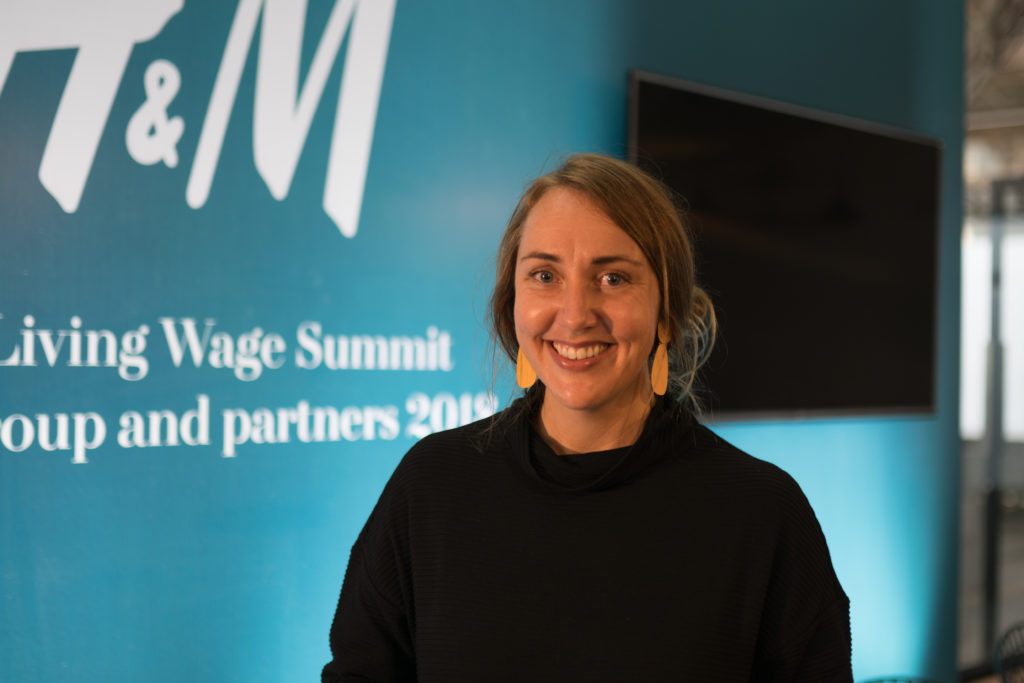Words from Jenny Fagerlin
Global Social Sustainability Manager H&M group
FIVE YEARS LATER
To make fair living wages a reality for garment workers around the world, there are certain steps that must be taken. If you skip the first steps because you are eager to hurry things up, you will end up with a shaky foundation that does not contribute to systemic change. The first steps are all about creating mechanisms, processes and collaborations – as well as a new mind-set. Indeed, complex and not very straight-forward things to communicate around, but essential when it comes to making fair living wages a reality for garment workers. That is what we have been working towards these past five years.

A solid foundation
Summing up, we can see that the processes are beginning to fall into place: by empowering garment workers and making fair negotiations possible, we have formed industry collaborations, thus making big leaps for the entire industry realistic. We have also improved our purchasing practices to ensure that they support fair living wages, for example by excluding labour costs from price negotiations. And most importantly, within the industry approach ACT, we have, together with 19 other brands and the global union IndustriALL that represents garment workers, paved the way for a true game-changer and turning point for the industry: collective bargaining agreements at industry level. Thus the first steps in creating a solid foundation for fair living wages have been taken. Even if our work is long term and we never held expectations of fair living wages by 2018, we can see some important progress when it comes to wages.
No magic button
When trying something no one has tried before, there is no silver bullet, no magic button you can press that provides the answer. You need to consult experts, trust your own experience, collaborate with others who share your vision and, most importantly of all, you need to stick to realistic solutions that will create real and systemic change, even if they take time. And you need to be patient. This is how all of us who work at H&M group are contributing towards our mission of improving garment workers’ wages.
In 2013, we decided to tell the world that we wanted to try to change the fact that wages in many garment-producing countries were below any meaningful understanding of living wage. We wanted to figure out how garment workers around the world could earn a fair living wage. We presented a plan at The Conference on Living Wages in International Supply Chains, a plan we developed in close consultation with experts, trade unions, suppliers and NGOs. A plan we have mainly stuck to, but also revised, since we are learning by doing – as we are testing things that nobody in our industry has ever done before.
What did we promise?
Some would say we stuck our neck out. And it stirred up a debate – one that has been going on ever since. What did we promise? Are we genuine or is it a PR stunt? Are we doing the right thing? Are we doing anything at all?
Our plan was to create a new mindset at the supplier factories, but also within our own company – because it certainly goes both ways. It was about implementing the right processes needed to instigate fair negotiations. It was about finding the right collaborations at industry level that would make it possible to transform the whole industry.
We also presented goals around this complex topic – goals that focused on implementing the necessary mechanisms that would enable wage increases. More specifically, they focused on the supplier’s ability to recognise the workers’ performance and efforts, and allow garment workers to be represented by democratically elected worker representatives. We also set out to create industry collaborations that would help to ensure that brands’ purchasing practices support wage increases.
Tomorrow
Now the time has come to work out the next steps, in dialogue with existing and new partners. We hold on to our vision that all garment workers should earn a fair living wage and our commitment is stronger than ever. Do you want to know more? Please see our latest press release on this topic.
Jenny Fagerlin, Global Social Sustainability Manager, H&M group,
who has worked on the Fair Living Wage strategy since the very first day.